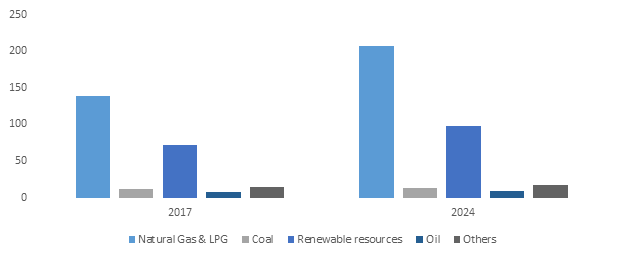Micro combined heat power market to characterized by the increasing adoption of renewable energy facilities, Japan to register considerable growth rate over 2018-2024
Publisher : Fractovia | Published Date : 2018-11-22Request Sample
Over the last few years, the rising significance of energy efficient power sources has led to micro combined heat power market emerging as one of the most lucrative business spaces in the energy cosmos. Among all sustainable energy alternatives, micro-CHP is known to provide 90% efficiency by generating both heat and electricity that has helped it gain popularity over other energy facilities. The use of micro-CHP plants in the residential sector has helped the masses to not only reduce their energy bills but also to curb carbon footprints.
Europe micro combined heat and power market size, by fuel, 2017 & 2024 (USD Million)

Taking into account the benefits of micro-CHP, several regional governments and energy companies have been continuously investing in the development of micro-CHP projects that will have a remarkable influence on the micro combined heat and power industry share. The increasing popularity of combined heat and power facilities among the regional governments has turned out to be rather profitable for the companies that have been contributing toward micro combined heat and power market. For instance, in California, the leading player in distributed waste heat-to-power, ElectraTherm has built its first power plus generator to produce fuel-free power from biomass boiler in partnership with the Sierra Institute and Wisewood Energy. As the U.S. traverses toward becoming more reliant on renewable and efficient energy facilities, the stand taken by the companies to develop emission-free and fuel-free power generation facilities will help them accumulate substantial returns over the years ahead.
Of late, the energy sector is replete with a slew of modern technologies that has had quite an impact on the micro combined heat and power market. Initiatives taken by the energy and technology companies to ensure substantial deployment of clean and green energy alternatives are certain to fulfill the rising energy requirements. Recently, in Finland, Lempäälän Energia and Siemens inked an agreement in order to develop a microgrid. With the development of this self-sufficient smart grid in an industrial area, the firms plan to generate an environment-friendly and cost-effective energy system. Their main goal is to support the decentralized generation of renewable energy to ensure fool-proof working for the energy sector. Accordingly, they have been adopting automated technologies that will help both the companies enhance their performance.
Siemens, as a part of this deal, plans to design and develop smart medium-voltage grid integrated with electrical storage system and grid automation system. These microgrid facilities will apparently be using combined heat and power production to maximize efficiency. The continuous efforts put forth by the companies to introduce advanced CHP solutions to enhance the thermal and electrical efficiency of power plants is thus likely to propel the product demand over the years ahead.
India has lately emerged as a pivotal revenue pocket for APAC micro combined heat and power market. In India, the energy requirement of the rapidly increasing population has put regulatory bodies in a quandary. In order fulfil the escalating energy demand, the Indian government has been implementing various energy policies over the last few years. In addition, heavy investments in the industrial sector has been helping decision makers develop new power generation projects for accomplishing the energy demand from laymen and the commercial and industrial sectors.
Merely a few days before, a subsidiary of GAIL (India) Limited, GAIL Gas has signed an MoU with Energy Efficiency Services Limited (EESL) to accelerate the development of tri-generation and co-generation projects and the use of natural gas across commercial as well as industrial sectors. The MoU is certain to emerge beneficial for commercial establishments like hospitals, hotels, malls, airports, residential complexes, data centers, and educational institutes, owing to the usage of combined heat & power technology.
Another APAC region that has making inroads in micro combined heat and power market is Japan. Japan has lately has also been investing heavily to deploy CHP plants on large scale. Reportedly, Japan micro combined heat and power industry will register a CAGR of more than 32.5% over 2018-2024.
The continuous involvement of regional governments in the construction of power projects to meet the future energy solutions is slated to have a positive influence on the micro combined heat and power industry trends. The launch of new technology trends will further aid the expansion of micro combined heat and power industry. Driven by the growing awareness about the benefits of efficient and emission-free energy utilities, micro combined heat and power market will surpass a revenue collection of USD 13 billion by the end of 2024.